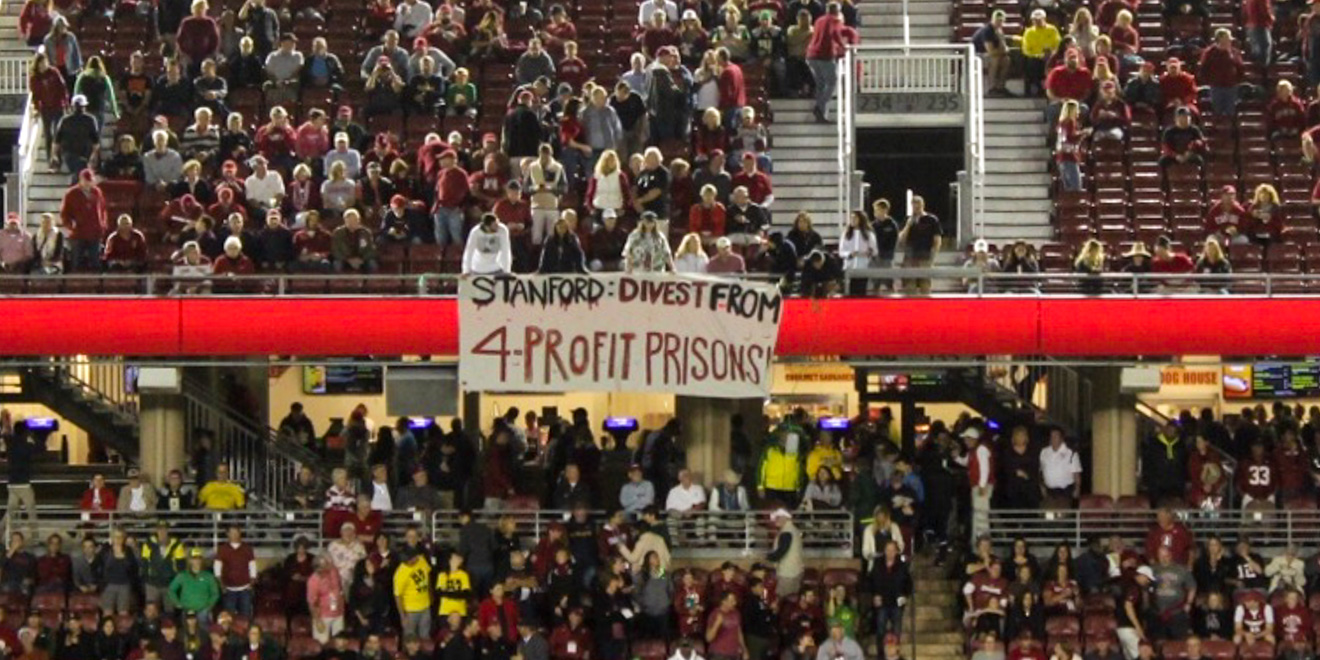
“STANFORD: DIVEST FROM 4-PROFIT PRISONS.” Those were the words painted on a banner that a group of students dropped at the Stanford Stadium during Saturday’s homecoming football game.
The act was in response to the Stanford Board of Trustees’ recent decision not to ask corporations that benefit from or participate in the funding or operations of private prisons to cut their ties with the prison industry or lose Stanford’s investments.
“We dropped the banner to signal that Stanford has no choice but to listen,” a coalition of student activists identifying themselves only as “concerned students” stated in a joint press release. “We will continue to resist mass incarceration and the exploitative, violent criminal justice system and argue, ‘Stanford tells us we can change the world for the better, but doing so funds our education with investments that hurt the communities we come from.’”
The Board of Trustees announced its decision on Oct. 10, in response to a proposal submitted by Stanford Prison Divest in September 2016. The group objected to Stanford’s involvement with companies that it says profit from mass incarceration, which disproportionately affects minority groups.
In its response to Stanford Prison Divest, the Board of Trustees acknowledged the significance of the issue raised by the group but declined to threaten divestment from various companies it holds stakes in, noting that Stanford is not directly invested in the companies that operate private prisons.
“Because Stanford does not hold any direct investments in them, we conclude there is no action for the Board to take,” Special Committee Chair on Investment Responsibility Gail B. Harris ’74 JD ’77 wrote in the Board of Trustees’ response.
The Board argued that the three other groups of companies flagged by Stanford Prison Divest — those that provide services to inmates, those that invest in private prisons and those that use inmates as workers — do not cause the direct harm that Stanford’s investment guidelines state as grounds for divestment.
Those behind Saturday’s banner said the Board’s decision runs contradictory to the University’s code of conduct and maintain that even if Stanford does not invest directly in private prison operators, profiting from investments in companies that are involved in the private prison industry is unethical. Stanford Prison Divest argues that the companies hurt prisoners through actions such as paying sub-minimum wages to inmate workers and overcharging inmates for services such as phone calls.
“With this decision, Stanford’s Board of Trustees has maintained Stanford’s complicity in this system of violence and oppression,” the activists’ press release stated.
The group added in its press release that any decision by Stanford to divest would be largely symbolic but still valuable. Divestment would “serve as a powerful statement and tool to educate the greater community on what people believe is acceptable to invest in,” the students wrote.
The students who participated in the protest at the football game declined as a group to be interviewed by The Daily.
In its statement, the Board of Trustees noted existing efforts on campus to promote change in the criminal justice system, including the Stanford Criminal Justice Center, SPARQ: Social Psychological Answers to Real-world Questions and the Prison Education Project.
“Stanford is already actively engaged, through its teaching and research, in the national discussion about the equity and effectiveness of the criminal justice system,” Harris wrote.
The Board of Trustees also noted that it is initiating a review of its Statement on Investment Responsibility and related procedures that will run throughout the 2017-18 academic year.
Students supporting dissociation from companies with private prison connections have still vowed to take action against what one student group involved, Students for the Liberation of All People (SLAP), characterized in a mass email Saturday as Stanford’s “deliberate action to continue its unethical investments.”
“This is just the start of a student response,” SLAP’s email said.
Contact Julia Ingram at jmingram ‘at’ stanford.edu.
